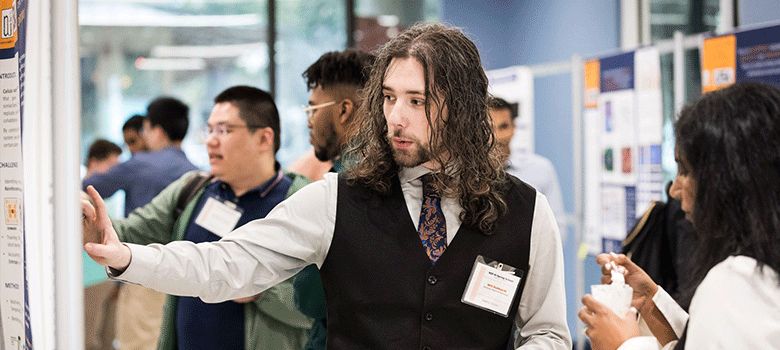
Students at the event explored a variety of AI career paths.
“It was like our students experienced the best of both worlds, and I hope it advanced their overall understanding of the field of AI and ML [artificial intelligence and machine learning], and especially AI/ML techniques for edge systems,” said Jadliwala. “It was an excellent mix of keynotes and plenary talks by well-known researchers discussing recent advances in AI/ML techniques, their applications and related challenges, as well as in-depth hands-on tutorials on classical AI paradigms such as continuous learning, federated learning and neuro-inspired learning.”
“Sessions were immersive and diverse, featuring panels, live sessions with AI pioneer Bernard Widrow, the inventor of the LMS learning algorithm, plenary talks delivered by Duke ATHENA researchers, and student poster sessions,” said Kudithipudi, MATRIX AI founding director. “This multifaceted approach provided a rich and engaging experience for all participants, offering a comprehensive exploration of AI.”
Neuro-inspired AI is a subfield of AI research based on the hypothesis that biological neural systems can serve as an inspiration to improve the design of AI systems. Research in this area seeks to allow AI systems to exhibit adaptive learning, operate with fewer data samples – and to design sustainable and energy efficient AI architectures. Presentations on making computing more brain-like and neuromorphic algorithms were given by Mike Daviesand Helen Li, respectively, in this area.
Edge computing refers to computing done on edge devices such as IoT devices. These products bring computing physically closer to the user and data and can collect and process data in real time. MATRIX thrust leads and PhD students offered in-depth tutorials on machine learning models for continual learning and neuromorphic computing for the edge. The keynote address from Moran Cerf explored the use of AI for decision-making and trust-building.
In addition to neuro-inspired AI, the NSF AI Spring School explored federated learning, an approach to training machine learning models without exchanging data to global services for increased data privacy. Instead, the machine learning model uses raw data that is available on the edge device.
“While our federated learning security and privacy tutorial sparked an interest among our students and led to very inquisitive lunch discussions, it also enabled more collaboration paths with our NAIAD partners,” said Ciocarlie. “Our first NSF AI Spring School was a perfect medium toward MATRIX’s vision of building trustworthy AI systems.”
“The NAIAD, led by UTSA and in collaboration with the Duke ATHENA AI Institute, offers a remarkable chance to foster collaboration between the two institutions in pushing forward neuro-inspired mechanisms in AI systems,” said Li. “It also provides an exciting opportunity to prepare a diverse cohort of students with the skills and knowledge to pursue research and careers in artificial intelligence, as exemplified by the success of the Spring School event.”
Collaborators and hosts said that the event was a much-needed venue for discourse on critical issues within the field.
“The NSF AI Spring School was a unique opportunity in the country to witness the imperative interaction between psychology and neuroscience with neuromorphic computing and artificial intelligence to advance the implementation of computationally and energetically efficient machines,” said Santamaria.
Matrix AI is working in collaboration with Duke University on a mentoring initiative that pairs AI faculty and PhD students from the two institutions to exchange ideas and conduct novel research collaborations. In the latter part of this year, UTSA researchers will further solidify and nurture these partnerships through visits to Duke University, building upon the strong foundations established during the mentoring initiative.
In addition to the NSF AI Spring School, the Matrix AI hosts a variety of events throughout the year, including the MATRIX AI Seminar Series, which runs weekly throughout the fall and spring semesters from 11 a.m. to noon on Fridays. This cross-institute series brings together students, faculty, staff and partners from industry, government and nonprofits for active dialogue on AI research topics.
The series features presentations by distinguished leaders in AI, including representatives from academia and industry, discussing subfields such as trustworthy AI, algorithms, theory, systems, autonomy, medical AI, and accelerators.
Previous presenters have included representatives from Meta, Cerebras, Intel, Apple and Nvidia.






